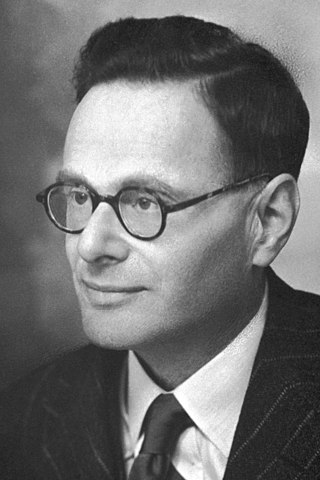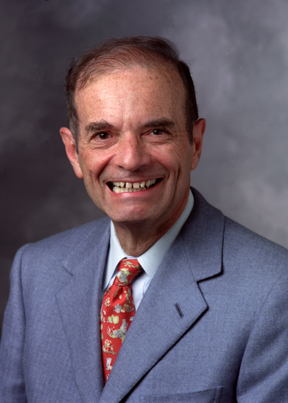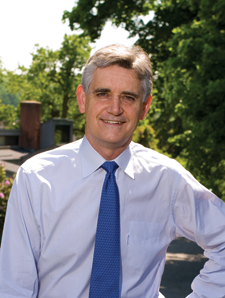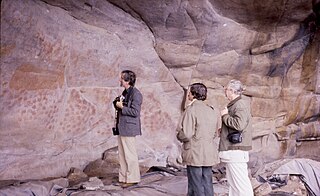Related Research Articles

Sir Hans Adolf Krebs,FRS was a German-British biologist,physician and biochemist. He was a pioneer scientist in the study of cellular respiration,a biochemical process in living cells that extracts energy from food and oxygen and makes it available to drive the processes of life. He is best known for his discoveries of two important sequences of chemical reactions that take place in the cells of nearly all organisms,including humans,other than anaerobic microorganisms,namely the citric acid cycle and the urea cycle. The former,often eponymously known as the "Krebs cycle",is the sequence of metabolic reactions that allows cells of oxygen-respiring organisms to obtain far more ATP from the food they consume than anaerobic processes such as glycolysis can supply;and its discovery earned Krebs a Nobel Prize in Physiology or Medicine in 1953. With Hans Kornberg,he also discovered the glyoxylate cycle,a slight variation of the citric acid cycle found in plants,bacteria,protists,and fungi.

The University of Cape Town (UCT) is a public research university in Cape Town,South Africa. Established in 1829 as the South African College,it was granted full university status in 1918,making it the oldest university in South Africa and the oldest university in Sub-Saharan Africa in continuous operation.

Feodor Felix Konrad Lynen was a German biochemist. In 1964 he won the Nobel Prize in Physiology or Medicine together with Konrad Bloch for their discoveries concerning the mechanism and regulation of cholesterol and fatty acid metabolism while he was director of the Max-Planck Institute for Cellular Chemistry in Munich.

Hugh Esmor Huxley MBE FRS was a British molecular biologist who made important discoveries in the physiology of muscle. He was a graduate in physics from Christ's College,Cambridge. However,his education was interrupted for five years by the Second World War,during which he served in the Royal Air Force. His contribution to development of radar earned him an MBE.

Lubert Stryer was an American academic who was the Emeritus Mrs. George A. Winzer Professor of Cell Biology,at Stanford University School of Medicine. His research over more than four decades had been centered on the interplay of light and life. In 2007 he received the National Medal of Science from President Bush at a ceremony at the White House for elucidating the biochemical basis of signal amplification in vision,pioneering the development of high density microarrays for genetic analysis,and authoring the standard undergraduate biochemistry textbook,Biochemistry. It is now in its tenth edition and also edited by Jeremy Berg,Justin Hines,John L. Tymoczko and Gregory J. Gatto,Jr.
Sir Philip Cohen is a distinguished British biochemist known for his extensive contributions to the field of biochemistry,especially to the understanding of the role of reversible protein phosphorylation in cell regulation.

The Harry Oppenheimer Fellowship Award is awarded annually by the Oppenheimer Memorial Trust. It is considered the top award for research on the African continent.
Bert L. Vallee (1919-2010) was an Edgar M. Bronfman Distinguished Senior Professor at the Harvard Medical School. He was the founder and president of the Endowment and the CBBSM.

Bruce William Stillman is a biochemist and cancer researcher who has served as the Director of Cold Spring Harbor Laboratory (CSHL) since 1994 and President since 2003. He also served as the Director of its NCI-designated Cancer Center for 25 years from 1992 to 2016. During his leadership,CSHL has been ranked as the No. 1 institution in molecular biology and genetics research by Thomson Reuters. Stillman's research focuses on how chromosomes are duplicated in human cells and in yeast Saccharomyces cerevisiae;the mechanisms that ensure accurate inheritance of genetic material from one generation to the next;and how missteps in this process lead to cancer. For his accomplishments,Stillman has received numerous awards,including the Alfred P. Sloan,Jr. Prize in 2004 and the 2010 Louisa Gross Horwitz Prize,both of which he shared with Thomas J. Kelly of Memorial Sloan-Kettering Cancer Center,as well as the 2019 Canada Gairdner International Award for biomedical research,which he shared with John Diffley.
David Barford is a British medical researcher and structural biologist at the MRC Laboratory of Molecular Biology Cambridge,UK.
Sir Tony Kouzarides,FMedSci,FRS is a senior group leader Gurdon Institute,a founding non-executive director of Abcam and a Professor of Cancer Biology at the University of Cambridge.

Sir Stephen Patrick O'Rahilly is an Irish-British physician and scientist known for his research into the molecular pathogenesis of human obesity,insulin resistance and related metabolic and endocrine disorders.
Bongani Mawethu Mayosi BMedSci,MB ChB,FCP(SA),DPhil,was a South African professor of cardiology He was the Dean of the Faculty of Health Sciences at the University of Cape Town and an A-rated National Research Foundation researcher. Prior to this,he was head of the Department of Medicine at the University of Cape Town and Groote Schuur Hospital. his research interests included rheumatic fever,tuberculous pericarditis and cardiomyopathy. He was a member of the Academy of Science of South Africa and a former President of the College of Physicians of South Africa and he headed numerous other biomedical organisations during his career.
David Chaim Rubinsztein FRS FMedSci is the Deputy Director of the Cambridge Institute of Medical Research (CIMR),Professor of Molecular Neurogenetics at the University of Cambridge and a UK Dementia Research Institute Professor.

John Parkington is an Emeritus professor in archaeology and hunter-gatherers,Paleoenvironmental reconstruction and human ecology,prehistoric art,and coastal archaeology. He has suggested that since fish provide an important nutrient for the brain,the consumption of fish led to the emergence of the first really intelligent humans in the Western Cape region of South Africa. In February 2000 South African President Thabo Mbeki mentioned the letter he had received from Parkington,regarding the protection of archaeological heritage sites,in his address at the opening of South Africa's Parliament.

Tolullah "Tolu" Oni is a Nigerian urban epidemiologist at the Medical Research Council Epidemiology Unit at the University of Cambridge. She is a NextEinstein Forum Fellow and World Economic Forum Young Global Leader.

M. Madan Babu is an Indian-American computational biologist and bioinformatician. He is the endowed chair in biological data science and director of the center of excellence for data-driven discovery at St. Jude Children's Research Hospital. Previously,he served as a programme leader at the MRC Laboratory of Molecular Biology (LMB).
Jan-Hendrik HofmeyrFRSSAf is one of the leaders in the field of metabolic control analysis and the quantitative analysis of metabolic regulation.

Stuart John Saunders was a South African academic and vice-chancellor of the University of Cape Town from 1981 to 1996. He was known for his role "in ensuring that the spirit and values of a liberal education survived in South Africa before 1994,and since 1994."
Lionel Henry Opie was a South African cardiologist. He was a professor of medicine at the University of Cape Town,where he conducted both experimental and clinical research on heart disease and cardiovascular physiology,metabolism,and pharmacology. He was the founding director of the university's Hatter Institute for Cardiovascular Research and the founding editor of the Journal of Molecular and Cellular Cardiology. He also served as president of the International Society for Heart Research.
References
- 1 2 3 4 5 6 7 "Wieland Gevers 2000: Doctor of Science (Honoris Causa)". Nelson Mandela University. Retrieved 2024-06-25.
- 1 2 3 4 "Wieland Gevers (1937–)". Presidency of the Republic of South Africa. Retrieved 25 June 2024.
- 1 2 3 4 5 "New chapter in Gevers's distinguished career". University of Cape Town. 25 November 2002. Retrieved 2024-06-25.
- 1 2 3 4 5 6 7 8 9 10 11 12 13 14 15 16 "Gevers, Wieland". The World Academy of Sciences (TWAS). Retrieved 2024-06-25.
- 1 2 3 "80th Birthday Celebration in honour of Emeritus Professor Wieland Gevers". University of Cape Town. 27 November 2017. Retrieved 25 June 2024.
- 1 2 "Wieland Gevers". ASSAf. Retrieved 2024-06-25.
- ↑ Koenig, Robert (2006-05-12). "A Call to Improve South Africa's Journals". Science. 312 (5775): 831. doi:10.1126/science.312.5775.831b. ISSN 0036-8075. PMID 16690829.
- ↑ "National Orders awards 28 October 2008". South African Government. Retrieved 2024-06-25.